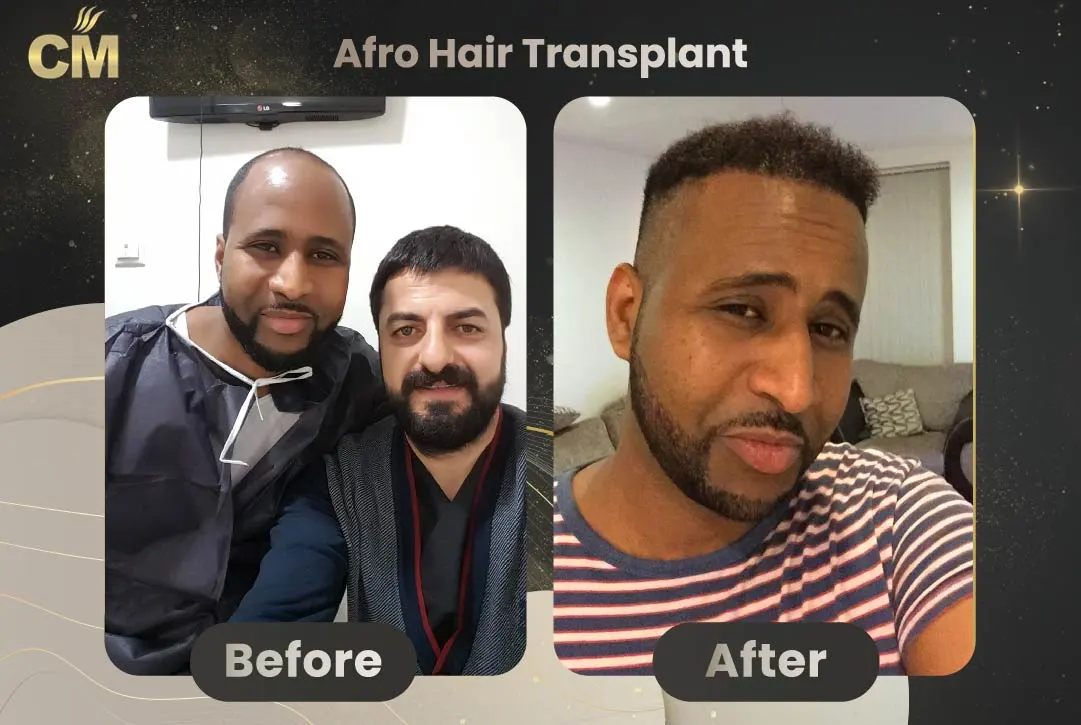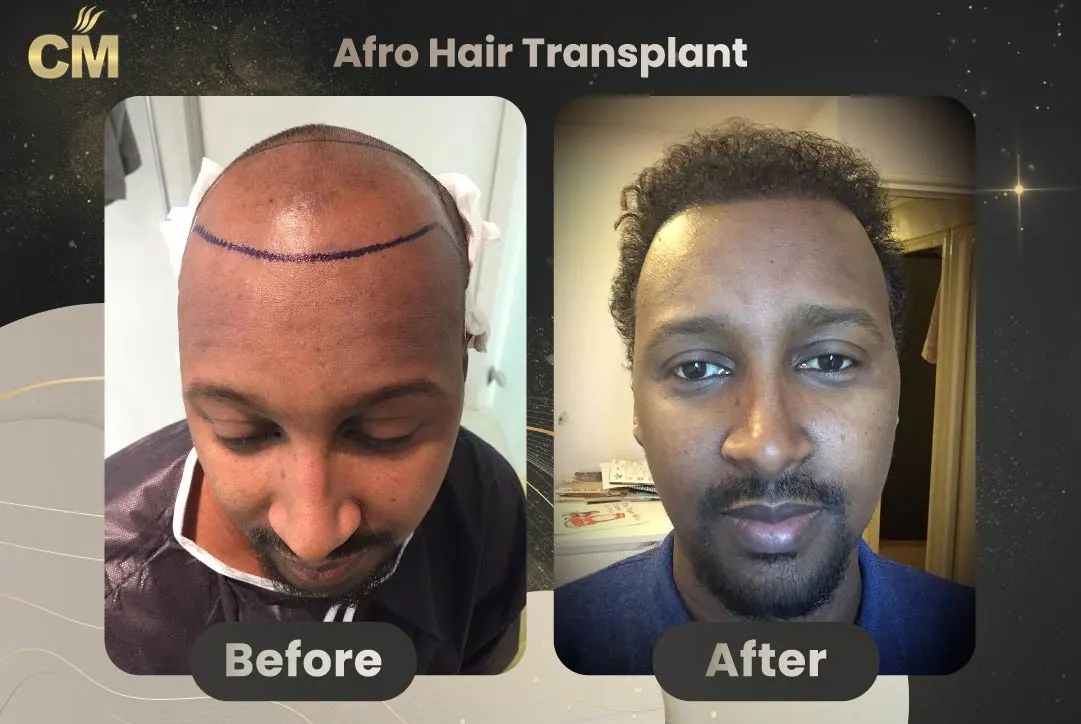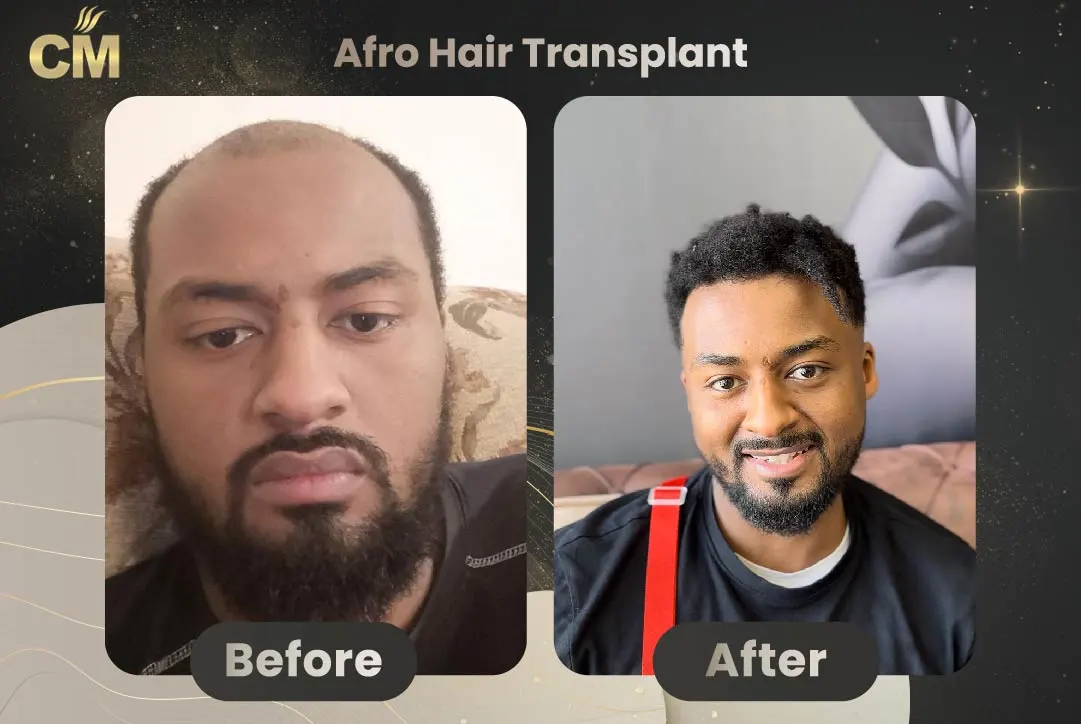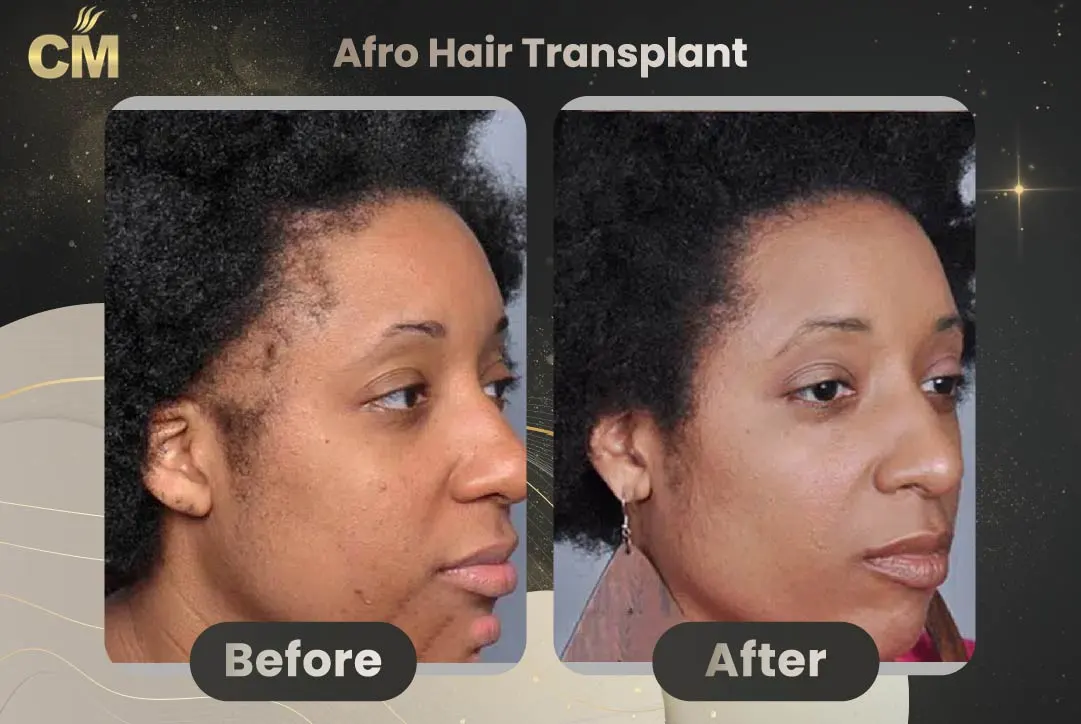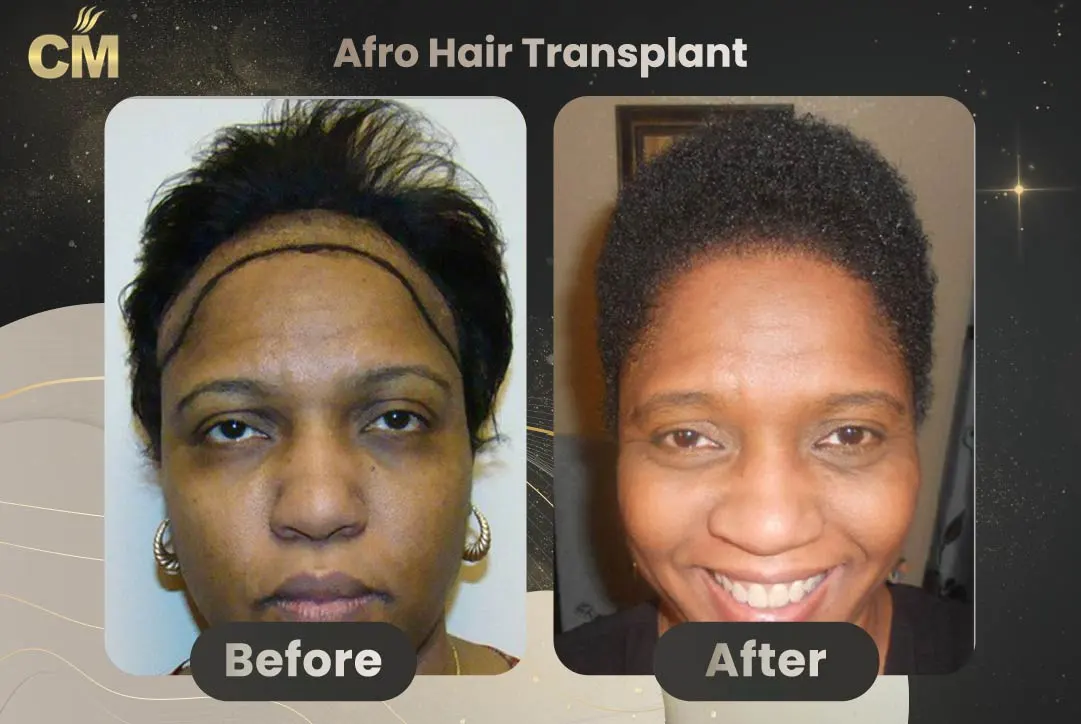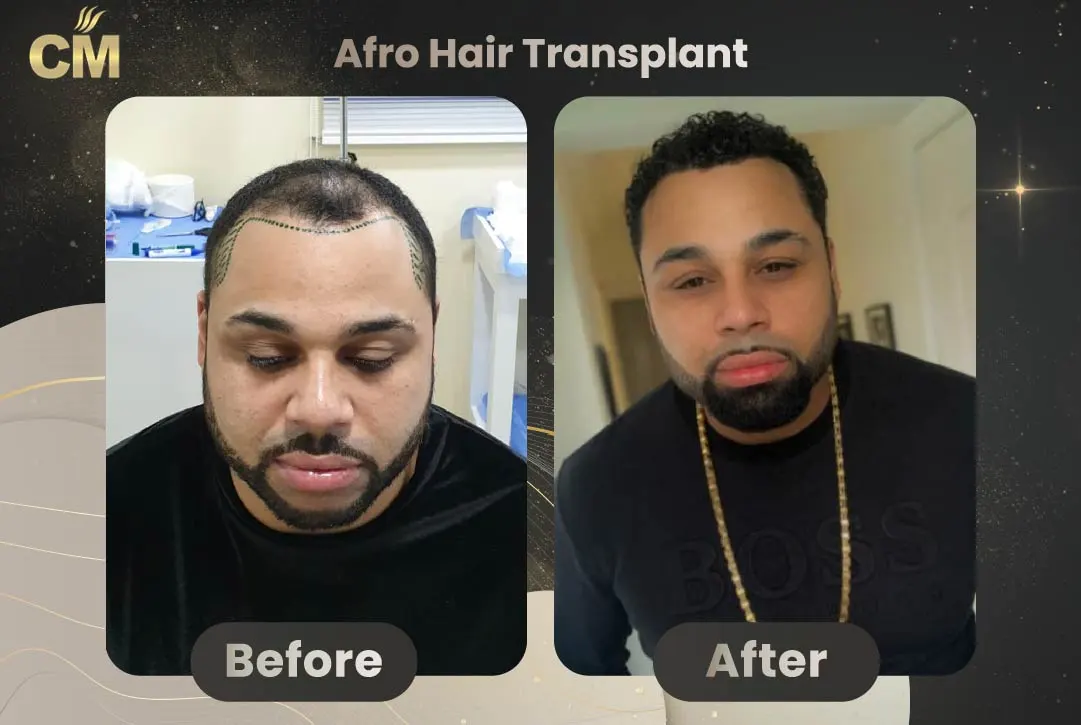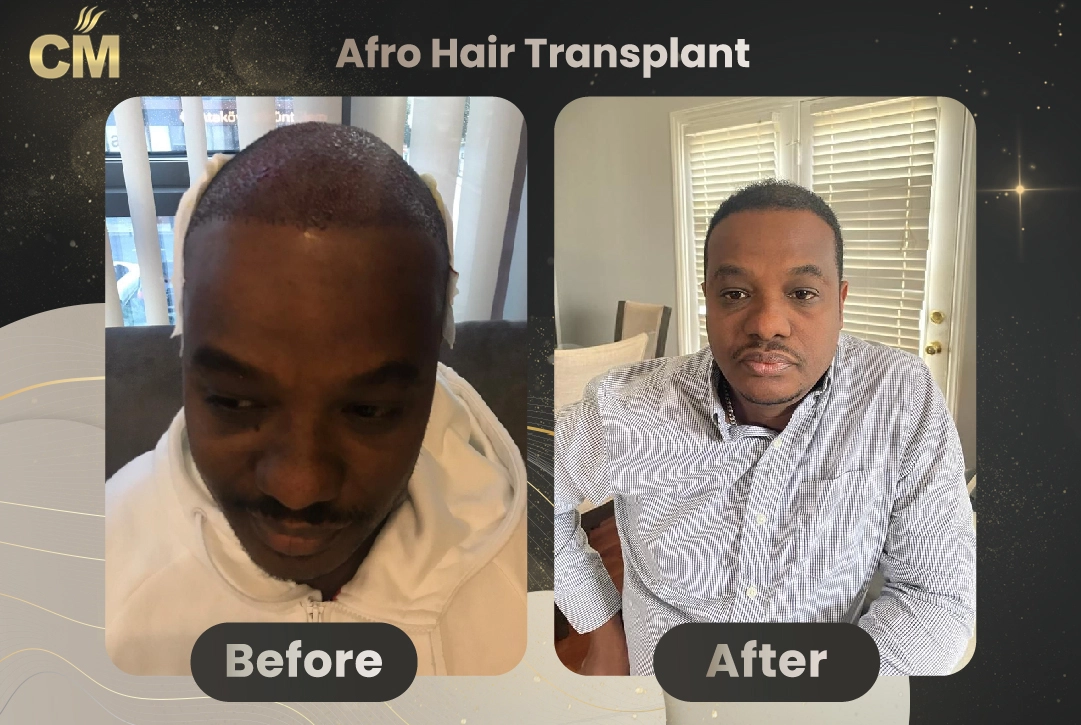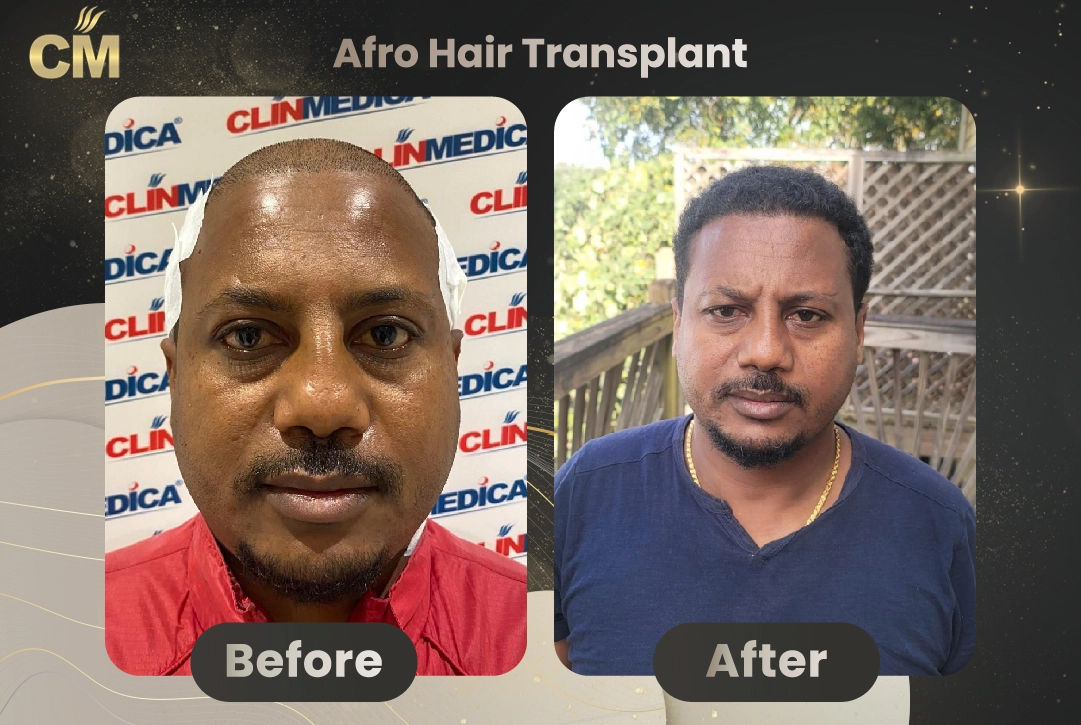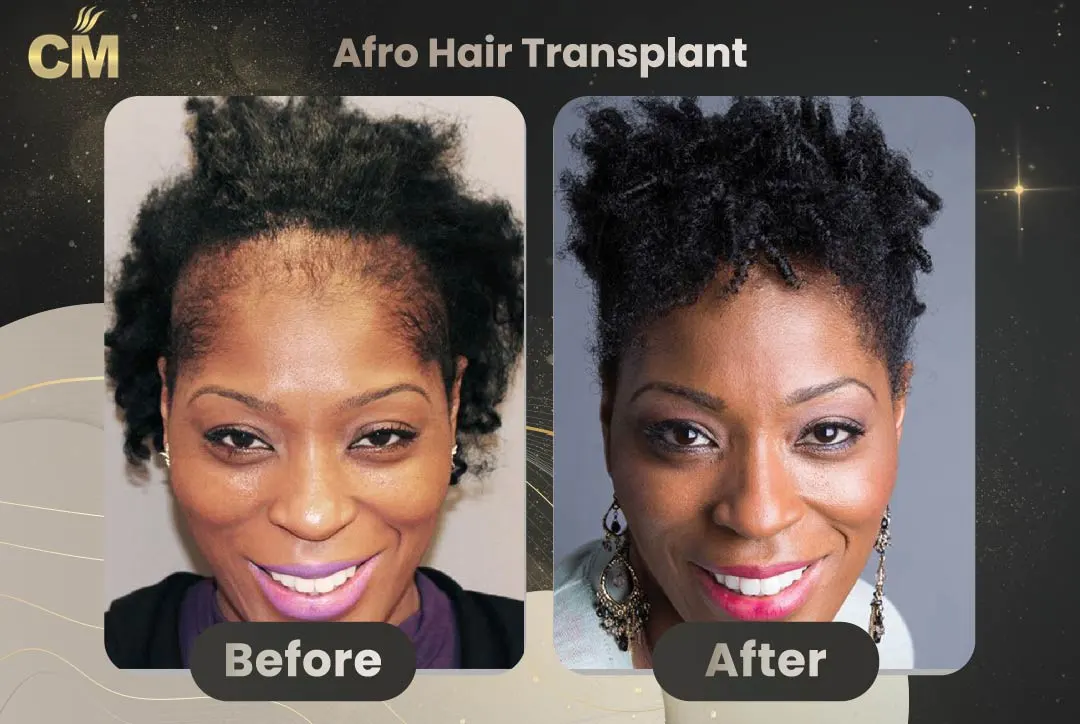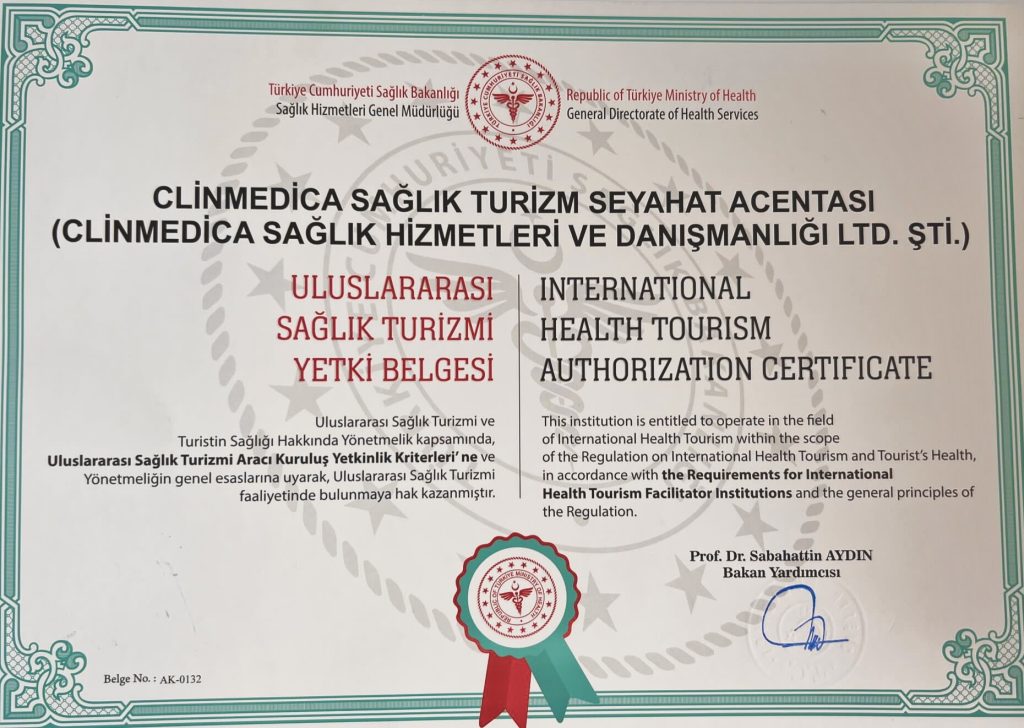Afro Hair Transplant Before and After: Explore the transformative journey that individuals experience through this specific hair restoration method.
On this article, you can explore pictures showcasing the results of Afro hair transplant operations, along with detailed information on how this procedure is performed, as well as essential guidance on what to expect before and after the procedure. With its clinics’ proven expertise in addressing the unique characteristics of Afro hair, Turkey stands out as an ideal destination for transformative hair restoration
Your Afro Hair Transplant Experience in Turkey
A Step-by-Step Guide
Personalized Consultation
Your journey begins with a comprehensive consultation with a hair transplant specialist. They assess your hair loss, discuss your goals, and create a custom treatment plan tailored to your unique hair type and desired outcome.
The Afro Hair Transplant Procedure
The preferred technique for afro hair transplants is often Follicular Unit Extraction (FUE). Hair grafts are individually extracted from a donor area, typically the back of your head, and meticulously transplanted to the balding or thinning areas.
Recovery and Aftercare
Detailed post-operative care instructions from your surgeon are essential for successful hair growth and minimal scarring. Therefore, following these guidelines diligently is key to achieving optimal results.
Natural, Beautiful Results
While it takes time, you can expect gradual hair growth that blends seamlessly with your existing hair. Over several months, you’ll enjoy a fuller, thicker head of hair that looks and feels entirely your own.
Selecting the Right Clinic
Your Key to Success
Thoroughly research and select a reputable clinic with a proven track record of successful afro hair transplants. Consider these factors:
Experience
First, choose a clinic with extensive experience specifically in afro hair transplantation.
Credentials
Next, ensure your surgeon is certified by recognized medical boards and has a strong reputation in the field.
Transparency
Moreover, request a clear breakdown of costs and avoid clinics with hidden fees or unrealistic claims.
Comprehensive Support
Finally, opt for a clinic that offers comprehensive aftercare and ongoing support throughout your hair restoration journey.
Embrace Your Renewed Confidence
An afro hair transplant in Turkey is more than a medical procedure; it’s a transformative experience. It’s about restoring your hair, your confidence, and your natural beauty. With the right clinic and surgeon, you can achieve a fuller, thicker head of hair that empowers you to feel your best.
What to Expect After an Afro Hair Transplant
Recovery Process
The recovery process for an Afro hair transplant is similar to other types of hair transplants but can involve specific considerations due to the nature of the hair. Patients typically experience mild redness, swelling, or discomfort in both the donor and recipient areas for the first few days. Scabbing will form around the transplanted grafts, but these scabs usually fall off within 7–10 days. Most patients can return to work and light activities within a week, while full recovery may take several months as the transplanted hair begins to grow.
Resuming Physical Activities After Surgery
It is essential to avoid strenuous activities, such as heavy lifting and sports, for at least two weeks after the procedure. Any activity that causes sweating or puts pressure on the scalp can disrupt the healing process. Light activities, such as walking, can be resumed shortly after surgery, and your surgeon will provide specific instructions on when it is safe to return to your normal exercise routine.
Maintaining the Results of an Afro Hair Transplant
left;”>Maintaining the results of an Afro hair transplant requires careful attention to aftercare and a healthy lifestyle. You may be advised to use specific hair care products designed for Afro hair to promote growth and maintain scalp health. It is important to avoid chemical treatments, such as relaxers, for several months after the transplant to protect the newly implanted grafts. Regular follow-up appointments with your surgeon will help ensure the long-term success of the procedure.
Scarring After an Afro Hair Transplant
Afro hair often provides more coverage, which can naturally hide minor scarring. Techniques such as FUE (Follicular Unit Extraction) or DHI (Direct Hair Implantation) leave minimal scarring, with small puncture marks that heal quickly. With proper care, any scarring will fade over time, and the tight curls of Afro hair can make the results appear even more natural.
Understanding the Risks of an Afro Hair Transplant
As with any surgical procedure, there are some risks involved in an Afro hair transplant. These include infection, scarring, or shock loss (temporary shedding of hair). However, these risks can be minimized by choosing an experienced surgeon and following the post-operative care instructions closely. Afro hair transplants can be more technically challenging due to the curvature of the hair grafts, making it even more critical to select a clinic like ClinMedica with expertise in this area.
Benefits of an Afro Hair Transplant
The benefits of an Afro hair transplant include restoring hair density in areas affected by hair loss, achieving natural-looking results, and boosting self-confidence. The procedure is highly effective for individuals with traction alopecia, a common condition caused by tight hairstyles. With proper care, the transplanted hair will continue to grow naturally for a lifetime, providing a permanent solution to hair loss.
Who Is Not a Suitable Candidate for an Afro Hair Transplant?
Not everyone is an ideal candidate for an Afro hair transplant. Patients with insufficient donor hair, advanced hair loss across the scalp, or certain medical conditions such as uncontrolled diabetes or autoimmune diseases may not be suitable. Individuals with unrealistic expectations may also be advised to reconsider. A detailed consultation with your surgeon will help determine if you are a suitable candidate for the procedure.
Things to Do After an Afro Hair Transplant
Key Post-Operative Care Steps
After the procedure, it’s crucial to follow your surgeon’s post-operative care instructions carefully. Keep the scalp clean and avoid touching or scratching the treated areas. You may be prescribed specialized shampoos or medicated products to aid in healing and promote growth. Hydration and a balanced diet will further support the recovery process.
Afro hair transplant recovery timeline
During the recovery period, avoid wearing tight hairstyles, such as braids or cornrows, that can pull on the scalp. Do not expose the scalp to direct sunlight, and refrain from using harsh chemicals or heat styling tools for at least a few months. Avoid swimming, saunas, and vigorous physical activities for at least two weeks to protect the newly transplanted grafts.
How Long Should You Stay in Istanbul for the Procedure?
For international patients traveling to Turkey for an Afro hair transplant, it is recommended to stay in Istanbul for at least 2–3 days. This allows sufficient time for the procedure and any necessary follow-up appointments to ensure everything is healing as expected before you return home.
How Many Nights Will You Stay in the Hospital?
Afro hair transplants are performed as outpatient procedures, meaning you can return to your accommodation the same day. There is no need for an overnight hospital stay, although follow-up appointments will be required in the days following the procedure.
Pre-Procedure Instructions for International Patients
If you are traveling to Turkey for an Afro hair transplant, it’s important to prepare thoroughly:
- Medical Preparation: Complete all necessary medical tests and provide your surgeon with a detailed medical history, including any medications or supplements you are taking.
- Packing: Bring loose, comfortable clothing and a hat to protect your scalp after the surgery.
- Flexible Flight Plans: Arrange flexible flights in case your recovery takes longer than expected.
- Documentation: Carry all relevant medical records, including test results and surgical clearances from your healthcare provider.
Do You Need a Companion for the Procedure?
While a companion is not mandatory for an Afro hair transplant, having someone with you can be helpful, especially for the first day of recovery. A companion can assist with daily tasks, provide support, and ensure you are comfortable during the initial healing phase. If traveling alone, consider arranging for post-operative care at your accommodation.
What Should You Do After an Afro Hair Transplant?
Post-Surgery Instructions
Your surgeon will provide specific instructions on how to care for your scalp after the transplant. It’s essential to avoid washing your hair for the first few days and follow any prescribed aftercare products. Attending follow-up appointments is crucial to monitor your progress and ensure optimal results.
Traveling Home After Surgery
Guidelines for Airport and In-Flight Care
If you’re flying home after an Afro hair transplant, especially on a long-haul flight, follow these guidelines:
- Timing Your Flight
Plan to stay in Istanbul for at least 3–5 days after the procedure to allow for initial healing and follow-up care before flying home. - In-Flight Care
During the flight:
- Stay Hydrated: Drink plenty of water to prevent dehydration and promote healing.
- Avoid Touching Your Scalp: Keep your hands away from the transplanted area to avoid disturbing the grafts.
- Wear Comfortable Clothing: Choose loose-fitting clothing to avoid pressure on the scalp.
- Pain Management: Carry prescribed medications in your carry-on luggage and take them as directed by your surgeon.
- Airport Assistance
Consider requesting assistance, such as help with luggage or a wheelchair, to avoid overexertion at the airport. Avoid lifting heavy bags or engaging in any strenuous activity that may put stress on your scalp. - Long-Haul Flight Considerations
For long-distance travel, take frequent breaks to stretch and move around to maintain circulation. Plan for additional rest days once you return home to allow your body to continue healing before resuming normal activities.
By following these post-surgery and travel guidelines, you can ensure a smooth recovery and a safe journey home after your Afro hair transplant. ClinMedica provides comprehensive care instructions to help you achieve the best possible results.
When Does Hair Grow After Afro Hair Transplant?
The transplanted hair grows after the third month, when the grafts settle in their place under the skin and begin to produce hair. The patient will obtain a satisfactory result in the sixth month, and hair growth will continue gradually until he completes a full year.
In this process, patients may need to be more careful for both nutrition and protection to help their hair grow better. Today, it is possible to see improvement more quickly with such measures.
At the same time, in the Afro hair transplantation method, patients may need to gain energy-giving nutritional habits to accelerate their recovery time. Different companies are serving in this field in our country. With these health centers, it is possible to perform hair transplantation with the desired properties. In many respects, people prefer to be in qualified health centers that meet such expectations.
Afro hair transplants in Turkey require specialized knowledge and techniques. However, with the right expertise and care, natural-looking results can be achieved.
When Will You See the Final Results?
The final results of an Afro hair transplant will take time to fully develop. Patients can expect to see new hair growth around 3–4 months after the procedure, with full results visible between 9–12 months. The transplanted hair will grow naturally, blending seamlessly with your existing Afro hair.
Learn About Afro Hair Transplant Procedure
